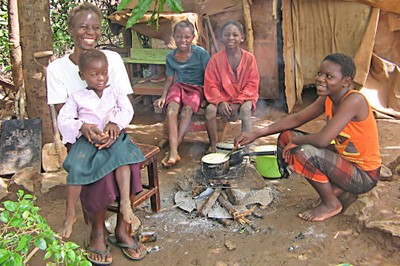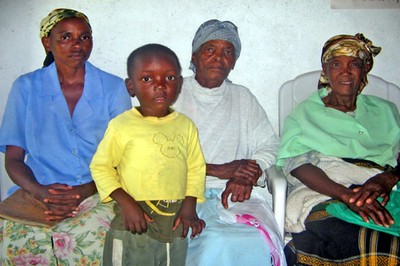Zimbabwe – SOS Social Centres
In Zimbabwe there are currently seven Social Centres for children and the local community, including those in Waterfalls, Bulawayo and Bindura. Many SOS Social Centres operate via Family Strengthening Programmes, which aim to support the wider community. Below is some information about some of the Social Centres that SOS Children runs in Zimbabwe:
If you'd like to find out how you can help provide medical care and education to children in Zimbabwe, see how you can help Zimbabwe's Children.
SOS Social Centres around Zimbabwe: In-Depth
 Bindura
Bindura
Description of SOS Social Centre/FSP:
Since 2003, family strengthening programmes have been co-ordinated, offering access to essential services for children’s development (eg. educational, nutritional and health support, social skills) and supporting families to protect and care for their children. The programmes also aim at linking families with income generating activities and offers help to improve the parents’ parenting skills. The programmes reach out to up to 3,000 children a year and provide them und their families with food, school fees, basic medical treatment, counselling and psychosocial support. Moreover, HIV and AIDS affected families are offered support to improve their housing and their living conditions. Those accepted onto the family strengthening programmes are mainly children who have lost both parents and now live with grandparents, older siblings or other relatives, as well as those whose parents are seriously ill.
Work and Achievements:
Psychosocial Support-Grief Work, Sport and Culture
Children in grief and bereavement continued to receive psychosocial support through sporting and cultural activities, and also through grief work and counselling sessions they were engaged in. A major therapeutic event was served to more than 300 children from Waterfalls and Bindura FSPs as well as Waterfalls and Bindura Children’s Villages who converged at HGSS ground to display their skills and talents as well as having fun. The Annual sporting gala was one of its kind as it brought together OVC as well as other children from the community. Through sporting and grief work children have continued to acquire diverse knowledge and skills in reproductive health as well as HIV/AIDS issues. Most children who participate in psychosocial activities have gained confidence and self esteem and are now more assertive.
Health-Medical Assistance
Eighty seven children and 166 care givers/parents with compromised health continued to access treatments from the Hospital throughout the year. Hence, this has seen the quality of their health improving tremendously. More partners have been established to enable beneficiaries access to essential services for health. We have also established partnership with Karanda Mission Hospital, New Life, ZAPSO and HOSPAZ whilst the Memorandum of Understanding with Bindura Provincial hospital continued to bear positive results. On the other hand, 21 Mobile Clinics were held at Maizelands, one school health programme conducted at Wayerera, Dengu and Chiveso primary schools.
Home Based Care
In response to HIV/AIDS impact, 14 trained care givers are providing Home Based care services in Bindura FSP programme. HOSPAZ donated 40 Home Based Care kits, whilst cluster support groups continue to receive post test support counselling sessions every Saturday at New Life Centre (Hope Humana).
Waterfalls
Description of SOS Social Centre/FSP:
Since 2002, family strengthening programmes have been co-ordinated, offering access to essential services for children’s development (eg. educational, nutritional and health support, social skills) and supporting families to protect and care for their children. The programmes also aim at linking families with income generating activities and offers help to improve the parents’ parenting skills. Moreover, HIV/AIDS affected families are offered support to improve their housing and their living conditions. Those accepted onto the family strengthening programmes are mainly children who have lost both parents and now live with grandparents, older siblings or other relatives, as well as those whose parents are seriously ill. The long-term goal of this programme is to develop within the population and authorities and organisations on the ground proper consciousness of the AIDS problem, so that, in the future, they can take the support measures on their own. This programme reaches out to up to 3,000 children a year.
 Bulawayo
Bulawayo
Description of SOS Social Centre/FSP:
Since 2003, family strengthening programmes have been co-ordinated, offering access to essential services for children’s development (eg. educational, nutritional and health support, social skills) and supporting families to protect and care for their children. The programmes also aim at linking families with income generating activities and offers help to improve the parents’ parenting skills. The programmes reach out to up to 2,500 children a year and provide them und their families with food, school fees, basic medical treatment, counselling and psychosocial support. Moreover, HIV/AIDS affected families are offered support to improve their housing and their living conditions. Those accepted onto the family strengthening programmes are mainly children who have lost both parents and now live with grandparents, older siblings or other relatives, as well as those whose parents are seriously ill.
Work and Achievements:
During the year under review the Outreach programme has assisted a total of 4149 beneficiaries (in both the satellite and main FSP) registered with the programme. Two schools benefited from the block granting programme through the provision of text books while two other schools received support in the form of school furniture. Sobukhazi High School received material and manufactured 90 desks and 90 chairs revamping its carpentry department at the same time. Losikeyi primary school was supported with materials for the practical departments which included woodwork tools, sewing machines and cookery items.
The children’s activity programme was introduced and received overwhelming participation with over 400 children taking part in competitions relating to entertainment, debate, drama, quiz and public speaking. Children from the SOS Village also took part in the exercise.
Psychosocial Support
A total of 280 children took part in grief management and child rights workshops after reaching Memorandum of Understanding with Child Line. Sporting activities continue to be popular with the children and has seen children in the programme excelling in sporting competitions organized by other stake holders, e.g. The National Sports and Recreation Commission (SRC).
Health clinics were conducted in the community largely targeting the under 5s. Over 200 children were seen by the health officer and the CBO health task force team. Sixty two children with varying health problems were referred to the local clinic and caregivers were trained on child care. Four HIV and AIDS support groups are in place and involved in rendering psychosocial support to affected families.

 Return to Schools Wikipedia Home page…
Return to Schools Wikipedia Home page…
